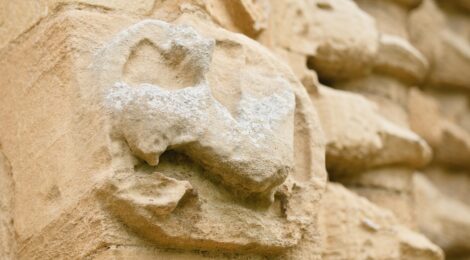
SERMON: Put on the whole armour of God
A sermon preached at St Mary’s Iffley by Andrew McKearney on 22 August 2021.
Tastes change even in the Church. And that can affect what hymns we sing, what prayers are included in prayer books and what passages of scripture we warm to.
Our first reading this morning uses a military metaphor for the Christian life, urging us to put on the whole armour of God.
It’s stirring language used to stiffen our resolve, speaking as it does of the seriousness of the Christian commitment to follow Christ. It reminds me of those moving speeches that commanders make to their troops before battle. And that’s the point: be strong in the Lord and in the strength of his power.
We’re less at ease though than we used to be in using military metaphors for the Christian life. We’re cautious about any element of force linked to religious faith; and certainly that unease is strengthened when we recall the history of the crusades and in our own day the rise of militant forms of other faiths.
But I remember last year near the beginning of the current pandemic needing to go back to the Book of Common Prayer of 1662 to find any reference to a prayer for use ‘In the time of any common Plague or Sickness’. No modern prayer book has anything comparable.
And there are aspects of the military metaphor that have an enduring significance. You don’t have to go very far in the Christian life to discover what a struggle it can be. We’re kidding ourselves if we imagine that discipline isn’t required of us to persevere. And we’d be foolish to underestimate the serious and corrosive forces stacked against us.
Perhaps the most lovely thing about our first reading is that the armour is God’s armour not our own – ‘put on the whole armour of God’. It’s offered to us by God to give us a strength beyond our own strength.
So put it on! Stand firm! Otherwise we too may find ourselves turning back, which, as we heard from today’s Gospel, many even of Christ’s disciples did.
It’s a pivotal moment in John’s Gospel.
The story of Christ feeding a great crowd in the wilderness is told by all four of the gospel writers. It was clearly one of those stories that lodged itself in people’s memories and was kept alive and retold because of its significance.
And certainly John in his gospel gives it his full attention! He starts his long sixth chapter with the feeding of the 5,000 and then spends the rest of the chapter doing what he always does – he invites us to go deeper, to plumb the theological and spiritual depths, to dig for the treasure implicit in this story.
At the end of the actual feeding, the crowd are full of enthusiasm. Of Jesus they say:
‘This is indeed the prophet who is to come into the
world.’
And because he’s so worried that they’re about to come and take him by force to make him king, Jesus withdraws again to the mountain by himself.
However the crowd follow him round to the other side of the lake and there he starts to teach them about the true significance of the bread that he’s given them to eat. On hearing about this they say:
‘Sir, give us this bread always.’
But when he then says that he is the bread that has come down from heaven, they begin to complain; and worse still when he talks about the bread that he will give for the life of the world being his flesh, they dispute amongst themselves about how that can be.
So alongside Christ’s profound reflection on the significance of bread in John chapter six, there’s a growing disquiet, culminating today when we heard not just the crowd, but Jesus’ disciples too say:
‘This teaching is difficult; who can accept it?’
And many of Christ’s disciples turn back and no longer associate with him.
The Galilean part of his ministry is now over. Jesus is to leave Galilee and go to Jerusalem. At this defining moment Jesus asks the twelve:
‘Do you also wish to go away?’
To which Peter’s replies:
‘Lord, to whom can we go? You have the words of
eternal life.’
At the beginning of the chapter Jesus was worried about the crowd wanting to take him by force to make him king. Contrast the action of the crowd then with Jesus here, where he uses no force to keep his disciples with him.
Instead, as Athanasius writing in the 3rd century pointed out:
‘It is the part of true godliness not to compel but to
persuade. Our Lord himself does not employ force but
offers choice.’
That’s exactly what’s been going on throughout this long chapter of John’s gospel – our Lord not employing force, but offering choice.
And in spite of the difficulties Peter’s resolve remains:
‘Lord, to whom can we go? You have the words of
eternal life.’
To persevere in the Christian life particularly in the face of difficulties, we need a strength beyond our own strength. Put on the whole armour of God.





